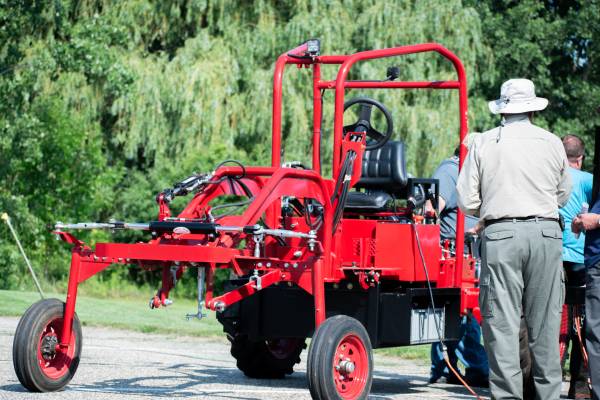
The Michigan Department of Agriculture and Rural Development (MDARD) offers the Farm Innovation Grant Program to in-state educational and research centers to develop and support innovative solutions to real, immediate, and future farm problems facing Michigan’s food and Agricultural industry.
MDARD awarded three research and outreach projects to faculty members in the Department of Biosystems and Agricultural Engineering (BAE) at Michigan State University (MSU).
Growing Fruit Trees in Digital Environments to Improve Resilience Against Labor and Climate Challenges
Michigan’s fruit producers face new challenges every year, with labor shortages and impacts from extreme weather events caused by climate change. Daniel Uyeh, Ph. D., is the principal investigator; Daniel Morris, Ph. D., and Jacquelyn Perkins are co-principal investigators on this project.
Extreme weather events are becoming more common, and digital twins can help growers combat the changes. The models use historical data and help growers plan, reduce risks, and implement proactive strategies. Uyeh and Morris are utilizing the grant funds to develop a 3D fruit tree that is both cost-effective and precise. The model will also predict tree growth and architecture, which can be used to aid robotic systems. Seasonality of labor needs in an orchard creates a unique challenge for fruit producers; if a producer is able to use a robotic system to harvest fruit, it can save time and decrease any potential damage to harvested fruit.
The team will also design the Artificial Intelligence (AI) enhanced digital twin software to utilize real-time data and continuously refine the information with live orchard dynamics. Digital twins are a virtual simulation of objects that are given their attributes by consistent data streams and advanced simulations. These systems can help systems move towards automated harvesting systems, assisting robots to identify and gently harvest ripe apples.
An Autonomous Electric Tractor-based System for Precision Vegetable Crop Production
Vegetable crops require significant resource and labor inputs for many operations such as weeding, accounting for a major production cost, especially labor. A team of MSU researchers is led by co-principal investigators Yuzhen Lu, Ph.D., Ajit Srivastava, Ph.D., and Daniel Morris, Ph.D. The team will develop an electric tractor-based autonomous system for precision vegetable production while reducing labor dependence and costs. They will modify the existing electric tractor technology and apply machine vision and artificial intelligence (AI) to enable high-precision farming operations.
The modified electric tractor will have improved hydraulic efficiency and longer battery life. A navigation system is also going to be added to achieve autonomous steering. Improving the electric tractor creates more appeal for growers, in addition to automated steering, as this will reduce their energy costs and carbon footprints. The team will build on the electric tractor by developing and adding weed detection and control capabilities through machine vision and automation innovations. The system will capture and utilize tens of thousands of images of weeds and vegetables to teach AI models for robust crop-weed discrimination. Site-specific precision weeding treatments will be applied to the detected weeds.
The team will host field days to showcase the research findings and provide hands-on learning opportunities to interact with the tractor. Allowing farmers to engage with the tractor and ask questions helps make adding an electric tractor to their production more appealing.
Improving disease management in carrot and asparagus production through climate-smart technology
Climate change brings new weather patterns, and farmers are feeling the impacts of that. Asparagus and carrot production go into fall, and the warmer weather follows it. Historically, growers have “put the sprayer away after Labor Day.” But recently, farmers have seen warmer temperatures continuing into the fall, negatively impacting their crops. A group of MSU Researchers, Younsuk Dong, Ph.D., assistant professor, and extension specialist in BAE, Mary Hausbeck, Ph.D in PSM, and Benjamin Werling, Ph.D. in Extension, have put together an innovative project to combat the challenge.
The team will utilize Low-Cost Sensor for Disease Management (LOCO-DM) and TOMCAST disease model to bring real-time data to producers to aid in decision making. The LOCO-DM continuously measures leaf wetness duration, temperature, humidity, and precipitation and records the data every fifteen minutes. The data is sent to an IoT (Internet of Things) cloud web server, which allows farmers to access real-time data anywhere using their smartphone or computer. The data is fed further into TOMCAST to determine disease risk, and the IoT system can alert the farmers.
The team will spend time ensuring that the LOCO-DM and TOMCAST systems are effective and useful to farmers. Finding the most reliable wireless communication method for rural areas is just one way they are ensuring that farmers will use this technology. They will also test multiple leaf-wetness technologies and evaluate a new method of testing leaf-wetness. The research findings will be presented at workshops with various stakeholders.
Did you find this article useful?
